
MARCH OF THE TITANS - A HISTORY OF THE WHITE RACE
CHAPTER 36 : THE MELTING POT - ROMANIA, BULGARIA, ALBANIA AND GREECE
Part ii - Bulgaria
BULGARIA
ANCIENT BULGARIA
Bulgaria, along with other Balkan states, was the site of some of the oldest civilizations on earth, with settlements in the region being inhabited by Old Europeans and Proto-Nordics dating from around 10000 BC. Some of the first Neolithic farming settlements on the European continent have been discovered there.
Bulgaria then was overrun by the great Indo-European invasions which started around 4000 BC - with the region eventually being occupied by some of the easternmost Slav peoples, who brought with them the battle-ax culture and iron working skills.
A short while later the region was overrun by one of the last great wave of Indo-European invaders, the Goths, who swept out of the east in a trek which would eventually take that group as far as Spain in the west.

Amphora from Panagyuritshe, Bulgaria, circa 350-300 BC. Archaeological Museum, Plovdiv.
ROMAN OCCUPATION
Occupied by the Romans, Bulgaria formed part of the provinces of Thrace and Moesia, and was held by that empire until the first great Asiatic invasion of Europe, that of Atilla the Hun.
ASIATIC INVASIONS HAVE LEFT THEIR GENETIC MARK
As it was one of the more easternmost lands occupied by the Indo-European Celtic branch of people, Bulgaria was also amongst the first to be invaded by the successive waves of Asiatic invaders who very nearly wiped out White Europe, starting with the invasion of Atilla the Hun, running through to the Avar, Magyar and Bulgar invasions, the last of whom ended up giving their name to the state.
The Bulgars very nearly took the city of Constantinople in 813 AD, but were for the greatest part driven out or killed in later conflicts, the details of which have been discussed in a previous chapter.
Bulgaria was also under intermittent Turkish Nonwhite Ottoman rule after the rise of Islam. All these Nonwhite occupations left their mark upon the Bulgarian population, so that it is possible to the present day to see a large number of noticeably darker elements amongst that country's peoples - although a substantial number do not show any signs of the mixing process which occurred over the course of several centuries. The proximity of Turkey and the long period of Ottoman occupation created a large Turkish minority in the country - of the Bulgarian population of just under 9 million at the end of the 20th Century, fully ten per cent are Turkish.
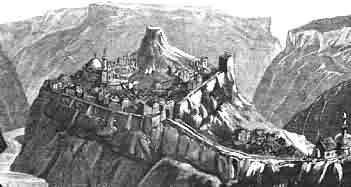
The citadel and palace of the Medieval kings of Bulgaria at Tirnovo. The well fortified stronghold of Tirnovo, or Trnovo, was the capital of the Bulgarian kingdom until the year 1393, when it was captured by the invading Nonwhite Turks. The last White Bulgarian king from this city, John Sisman III, died in a Turkish prison cell -symbolic of the fate of many of his White countrymen.
CHRISTIANITY OFFICIALLY DECREED 864 AD
With the dispersal of the last of the Bulgar Asiatics - either through military expulsion, execution or absorption into the native Slavic population - the Bulgarian state was established, which soon was extended to occupy a number of surrounding regions. In 864 AD the king of Bulgaria, Boris I, declared Christianity to be the official state religion, under aegis of the Byzantine Emperor, marking the acceptance of the new state by the papal authorities for the first time.
THE FIRST BULGARIAN EMPIRE - GREECE AND SERBIA ABSORBED
By 900 Bulgaria had developed enough to become one of the strongest powers in south eastern Europe. Under the reign of Boris' son, Simeon, the Bulgarians played a major role in defeating the Asiatic Magyar invasion. Simeon also gained fame for introducing a large number of social reforms which saw schools and infrastructure built - and for conducting a number of wars with the shrinking Byzantine Empire which constantly looked upon itself as having a duty to oversee as much of Christendom as it could.
These conflicts led to territorial acquisitions which included large areas of Greece. In 925 Simeon was in a position to declare himself Emperor of the Greeks and Bulgars. The following year Serbia was conquered and incorporated into the Bulgarian Empire.
RUSSIAN INVASION
The period of the First Bulgarian Empire did not last long. In 969 AD the then expanding Russians invaded and took the royal family prisoner in the capital city, Sofia. The Byzantines then intervened, sending troops in 970 into Bulgaria to fight the advancing Russians, who were viewed as a major threat to the security of Constantinople itself.
The Russians were then forced to retreat two years later, and the eastern part of Bulgaria was annexed to the Byzantine Empire as a result. The western part of Bulgaria lived on as an independent state until 1014, when it was also overrun by the Byzantines, and after this the whole country became a province ruled by the Eastern Roman Empire.
THE SECOND BULGARIAN EMPIRE - 1185 AD
Byzantine rule held until 1185 when a popular revolt saw the Bulgarians throw out the occupying armies. In that year the country was declared independent once again and the Second Bulgarian Empire was proclaimed.
The second empire was as land hungry as the first - by the 13th Century parts of Serbia, Macedonia and Albania were incorporated into the country through force of arms. This quick expansion however overstretched the Bulgarians: the Serbs were the first to rise up and inflict a decisive defeat upon the Bulgarian occupiers in 1330. This crushing defeat saw the Serbs turn the tables and for the next 25 years Bulgaria fell under Serbian rule.
THE OTTOMAN INVASION - 500 YEARS OF TURKISH RULE
By 1360 however, the great Nonwhite Ottoman invasion had reached the mainland of Europe. First overrunning regions in the South, the Turks quickly pushed their way north, and by 1396 they had conquered all of Bulgaria. Bulgaria then vanished as a political entity for five hundred years, and Turkish rule was entrenched in the region, along with a substantial amount of racial mixing.
THE BULGARIAN ATROCITIES - TURKS SLAUGHTER 30,000 BULGARIANS
Despite the limitations, occasional revolts - all unsuccessful - against the Turkish rule did occur from time to time during this period of occupation. Finally in 1876 a major revolt took place: after a desperate battle the White rebels were defeated. In an attempt to squash further rebellions, the Turks exacted a terrible reprisal - an estimated 30,000 Whites, men, women and children, were massacred by the Turks, with several villages being wiped out in the process. These massacres became known as the Bulgarian Atrocities.
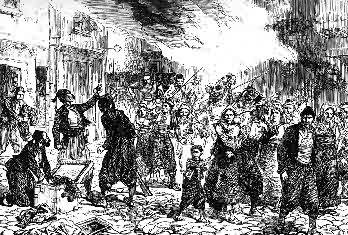
A scene from the Bulgarian Atrocities. The burning and the sack of Batak by Turks which left 7000 Bulgarians dead in 1876.
THE RUSSIAN-OTTOMAN WAR - ONE OCCUPIER REPLACES ANOTHER
The Bulgarians lay prostrate under the increasingly severe Turkish rule until salvation came when the Russian Empire, once again expanding westwards, declared war on the Ottomans in 1877. The Russians had refurbished their army and had massively industrialized their country: they quickly overwhelmed the centuries old Muslim Empire and inflicted a decisive defeat upon the Nonwhites in 1878.
In terms of the peace settlement between the Russians and the Turks, Bulgaria was divided into two sections, one becoming an autonomous principality under Russian influence, while the second part was made an autonomous Ottoman province.
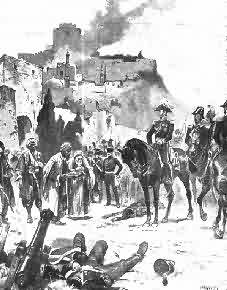
The Nonwhite Turks surrender the city of Varna in Bulgaria in 1828 after a determined White Russian assault on the town. Varna had long been the scene of conflict between White and Nonwhite. In 1444, Varna was the site of a battle in which a force under the Ottoman Sultan Murad II crushed a White army under by Wladyslaw III of Poland (who was also known as Ula1szo I of Hungary) and the Hungarian leader Janos Hunyadi. That battle opened the way for the Nonwhites to seize much of south eastern Europe, a situation which was only reversed in the early part of the 19th Century. Varna was occupied by British and French troops in 1854, during the Crimean War, when it served as a base of operations against the Russians. By the terms of a treaty drawn up at the Congress of Berlin (1878), after the Russo-Turkish Wars, Varna became part of the newly created Bulgarian principality. The city was renamed in honor of the Soviet dictator Joseph Stalin in 1949; the name Varna was restored in 1956.
UNITY AND CONFLICT
Bulgarian nationalism was however not dead. A new (partly representative) assembly of Bulgarians elected a new king of Bulgaria, the German Alexander of Battenberg, who was also a nephew of the Russian Czar. This led to another rebellion in the part of Bulgaria ruled by the Ottomans in 1885. This rebellion was successful and the two provinces were united to become the kingdom of Bulgaria. Despite the family relationship, the Russians however refused to recognize the new state, and the Russian ally in the region, Serbia, declared war on the united Bulgarians. Recovering quickly from the turn of events, the Bulgarians were able to defeat the Serbians.
In 1886 however a group of pro-Russian Bulgarians overthrew the new government and established a pro-Russian government. This was in turn overthrown within a few days, but the threat of further intervention caused the Bulgarian king to abdicate, with a new king being chosen in 1887, Prince Ferdinand of Saxe-Coburg-Gotha. It was Ferdinand, who taking advantage of an internal rebellion in the Ottoman Empire, declared Bulgaria finally independent of all outsiders in 1908.
THE BALKAN WARS - OTTOMANS FINALLY DRIVEN OUT
Within a few years the Balkan states had launched a final drive to expel the Turkish Ottomans. In the First Balkan War (1912-1913), Bulgaria, allied with Serbia, Montenegro, and Greece, defeated the Ottomans. A disagreement over the division of the occupied former Ottoman territories led however to the Second Balkan War in 1913, which Bulgaria, fighting against almost everybody else in the region, lost: as a result it had to surrender a considerable piece of territory.
WORLD WAR I - LOSES TERRITORY
Bulgaria took part in the First World War on the side of Germany and the Austro-Hungarian Empire: this led to the defeat of the country along with its allies and in terms of the armistice, the Treaty of Neuilly of November 1919, Bulgaria lost most of the land it had acquired in the First Balkan War, disarm and pay large reparations, conditions similar to those imposed on Germany and Austria.
INTERNAL DISSENSION
The period between the First and Second World War was marked by severe political instability. A dictatorial government established in 1919 was overthrown in a coup in 1923, and in 1925, Greece invaded Bulgaria over a territorial dispute. Intervention by the League of Nations, the forerunner to the United Nations, ended the war, with Greece being formally blamed for the conflict. Then in 1934 the Bulgarian king Czar Boris staged a coup of his own and established a royal dictatorship, a state of affairs which remained in place until 1944.
WORLD WAR II
The Bulgarian King's sympathies lay initially with Germany during the Second World War: in March 1941, Bulgaria officially joined the Axis powers, allowing German troops to use the country as part of the springboard for the invasion of Greece. Bulgaria then took an active part in the war against Greece and Yugoslavia, officially declaring war on these two countries in April 1941. As a result of the defeat of the latter two states, Bulgaria occupied all of Yugoslav Macedonia, Grecian Thrace and eastern Greek Macedonia.
In December 1941, imitating Germany, Bulgaria also declared war on the United States and Britain, fulfilling its obligations to the Axis powers in terms of the international anti-Communist "Anti-Comintern" pact which it had signed the previous month.
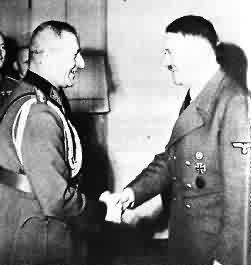
The Bulgarian Minister for War, General Michoff, meeting Hitler in Berlin during World War II. Bulgaria started off as an ally of Germany, but a 1944 coup saw it switch sides and join the Soviet Union.
Despite this move, Bulgaria never formally declared war against the Soviet Union: this remained so even after the Bulgarian king died in August 1943 and a pro-German government in Bulgaria strengthened the country's ties with Germany. By 1944 it was however clear that Germany was going to lose the war: in May 1944 the pro-German government in Bulgaria was overthrown in a coup.
The new government immediately cut its ties with Germany, but as the Soviet armies neared the borders of Bulgaria, the Soviet Union formally declared war on that country in September 1944.
The Bulgarian government ordered its army not to fight - agreeing to an immediate armistice, it allowed the Soviets free passage and then declared war on Germany. In terms of the armistice agreed with the Soviets, a pro-Communist government was immediately installed in Bulgaria under direct Soviet military supervision. A Communist government would remain in power until the middle 1990s.
THE COMMUNIST PERIOD - DRAMATIC FALL IN LIVING STANDARDS
In 1946 the Bulgarian king was expelled. Bulgarian participation in the war was formally ended by a treaty in Paris in 1947 in terms of which the country was compelled to pay reparations to Yugoslavia and Greece, and cede all territories gained during the course of the war.
Bulgaria became one of the most restrictive Communist countries of the entire Warsaw Alliance - the Sovietization of society saw a dramatic fall in living standards, and the country had to be substantially subsidized by the Soviet Union to prevent a total collapse.
OFFICIAL ANTI-TURKISH POLICY
During the 1980s the Bulgarian government started with a deliberate program to drive the remaining Turks out of the country. This was executed under the guise of a policy officially claiming to integrate the Turks into the rest of the population: measures implemented essentially boiled down to an attempt to extinguish Turkish culture in Bulgaria. Turks were forced to adopt Slavic names and it became illegal to speak Turkish in public.
The policy had some effect - during 1989 alone, more than 300,000 Turks left the country, crossing the border into Turkey. The policy was abandoned in 1989 when the Soviet Union fell and the Communist alliance fell apart.
THE FALL OF COMMUNISM - COMMUNISTS REELECTED
Democratic reforms after the abolition of the one party state led to the first ever democratic elections in Bulgaria in June 1990 - they were won by the reformed Communist Party, renamed the Bulgarian Socialist Party.
This crypto-Communist electoral victory, combined with the usual economic problems associated with converting an economy from a state controlled system to free enterprise, caused a further massive decline in living standards in Bulgaria, a decline which lasted right through to the end of the 20th Century.
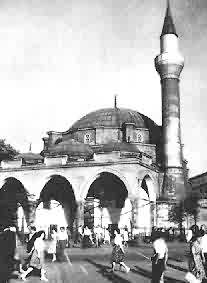
A mosque in Sofia serves as a stark reminder of the nearly five hundred years of Ottoman Turkish rule in that country. A small percentage of the Bulgarian population show clear signs of mixed ancestry - another tangible result of the years of Nonwhite rule in the Balkans. The Communist era government in Bulgaria launched an attempt in the 1980s to drive the remaining Turks out - and then some 300,000 fled back to Turkey.
IMMIGRATION AND GYPSIES
Largely due to the unfavorable economic situation, Bulgaria has not been a focus of immigration, legal or illegal, and as such possessed no significant Third World immigrant population at the end of the 20th Century. However, the effect of centuries of Asiatic and Ottoman occupation - and a Gypsy (originally Indian) population of over half a million - has left a clearly identifiable mark upon a significant minority of the population. Decades of Communism has also taken its toll on the infrastructure and economy.
Click here for Part iii - Albania
or back to
or back to
or
All material (c) copyright Ostara Publications, 1999.
Re-use for commercial purposes strictly forbidden.